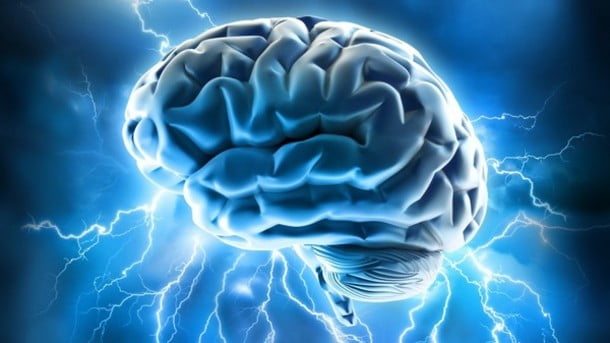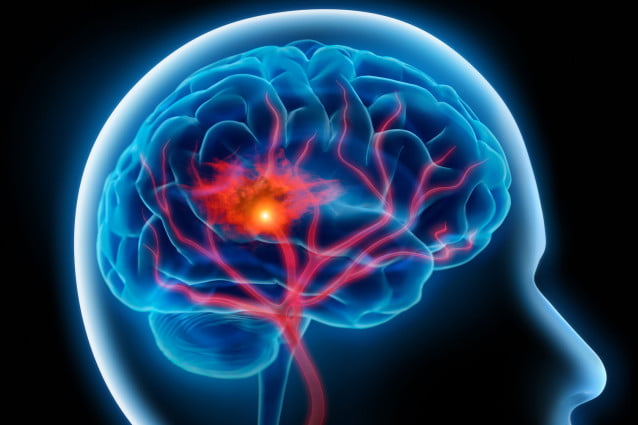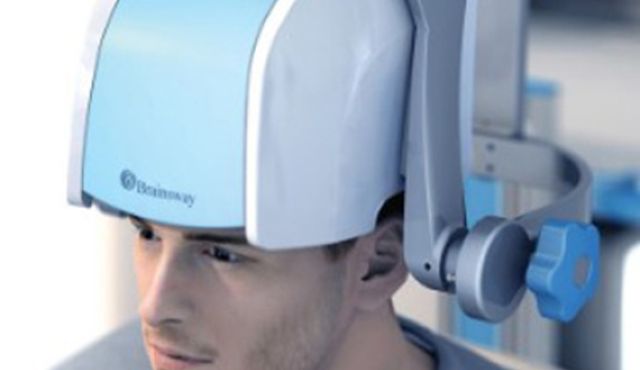A new medical technology designed to treat a range of conditions is gaining momentum in the world of psychiatry, potentially relieving depression, post-traumatic stress disorder (PTSD), addiction, obesity and epilepsy. Deep TMS stimulates brain regions using brief magnetic pulses, and has been shown to trigger a response in 38 percent of severely depressed patients, according to recent studies.
According to the CDC, 3 to 4 percent of American adults suffer from major depression. For those seeking help beyond psychotherapy and psychiatric medication, Deep TMS might provide an alternative treatment.
Developed by Israeli company Brainsway, Deep TMS stimulates relevant areas of the brain with a non-invasive treatment using electro-magnetic waves which run through a special helmet. Founded in Jerusalem by Dr. Yiftach Roth and Dr. Abraham Zangen in 2003, Brainsway considers Deep TMS to be its flagship technology, and claims its has no systemic side effects. “The company’s vision is to bring a new perspective to brain therapy and to open new possibilities for noninvasive effects on brain networks,” Roth, Brainsway’s chief scientist, tells NoCamels.
SEE ALSO: Researchers Shed Light On Depression By Curing Depressed, Stressed-Out Mice
The FDA has provided approval for Deep TMS since studies conducted by the company have shown positive effects: the response rate was 38.4 percent, meaning patients showed dramatic reduction in symptoms. Most importantly, some of these participants did not respond to medications and other treatments. According to Brainsway, the outpouring of gratitude from such patients has been immense, many of whom considered themselves dysfunctional prior to the treatment. “Knowing that something we developed brings so much relief to so many people is very rewarding,” Roth says.
Non-invasive, patient-friendly treatment
During treatment, the patient wears a helmet that has coils (metal wires), through which currents run and create an electromagnetic field in the brain. The shape of the coil determines the distribution of the electromagnetic field that it produces, penetrating the brain in a non-invasive way. When the coil is placed above the motor cortex of the brain, the area that controls movement, the magnetic pulses cause movement in the hands or the legs by activating neurons that control these specific muscles.
In the same way, doctors use Deep TMS to affect neurons responsible for higher functions of the brain, giving them repeated pulses, thus causing changes in the networks that are related to a variety of conditions, ranging from depression, to obesity and addiction. For example, the coil could be placed to affect the part of the brain that is responsible for drug craving, while also targeting the part of the brain that is responsible for inhibitory control, thus potentially reducing the need for the drug, while increasing the ability to stop substance abuse.
Sign up for our free weekly newsletter
SubscribeOngoing research into the effects of Deep TMS on Alzheimer’s disease
While Brainsway continues to develop Deep TMS, studies are taking place around the globe: in Israel, there are various ongoing studies of depression, obsessive-compulsive disorder (OCD), PTSD, Alzheimer’s disease and attention deficit hyperactivity disorder (ADHD).
SEE ALSO: Israeli Researchers Track Post-Traumatic Stress In The Brain
In the US, Deep TMS has been granted FDA approval for the treatment of major depression; however, studies are still ongoing for approval of treatment for OCD, bipolar disorder, multiple sclerosis and autism. Researchers at Columbia University study Brainsway’s treatment of cocaine addicts, and Harvard University is conducting a study on children with epilepsy.
Since it would take years of research to find the optimal pattern of magnetic pulses to optimize treatment, Brainsway is developing a more advanced, multi-channel helmet, which will combine stimulation from different coils to further target brain regions and personalize treatment. Potentially, the helmet will combine data from other scans, such as the basic brain MRI.
However, some people are still wary about Deep TMS because it reminds them of electric shock therapy (ECT). ECT, which is used to treat mental illnesses, has gotten its share of controversy over the past century, during which it has been portrayed in popular culture as disturbing and painful. The film “One Flew over the Cuckoo’s Nest,” for example, painfully depicts ECT in the famous scene of a patient (played by actor Jack Nicholson) strapped down, writhing in pain, while in shock therapy. Zangen and Roth stress that Deep TMS uses brief magnetic pulses, as opposed to the notorious Electroconvulsive Therapy (ECT), which is based on electrically induced seizures. Brainsway also claims that while ECT requires anesthesia and has severe side effects, including memory loss, Deep TMS does not involve seizures, anesthesia, has no effects on memory, and is well tolerated.
The future goal of Brainsway is to further increase the rate of success in patients who do not respond to medication, or who cannot tolerate the side effects of medication, and ideally, to help patients reach 100 percent remission, using individualized brain therapy.
Photos and video courtesy of Brainsway
Related posts

Israeli Medical Technologies That Could Change The World

Harnessing Our Own Bodies For Side Effect-Free Weight Loss

Missing Protein Could Unlock Treatment For Aggressive Lung Cancer







Facebook comments